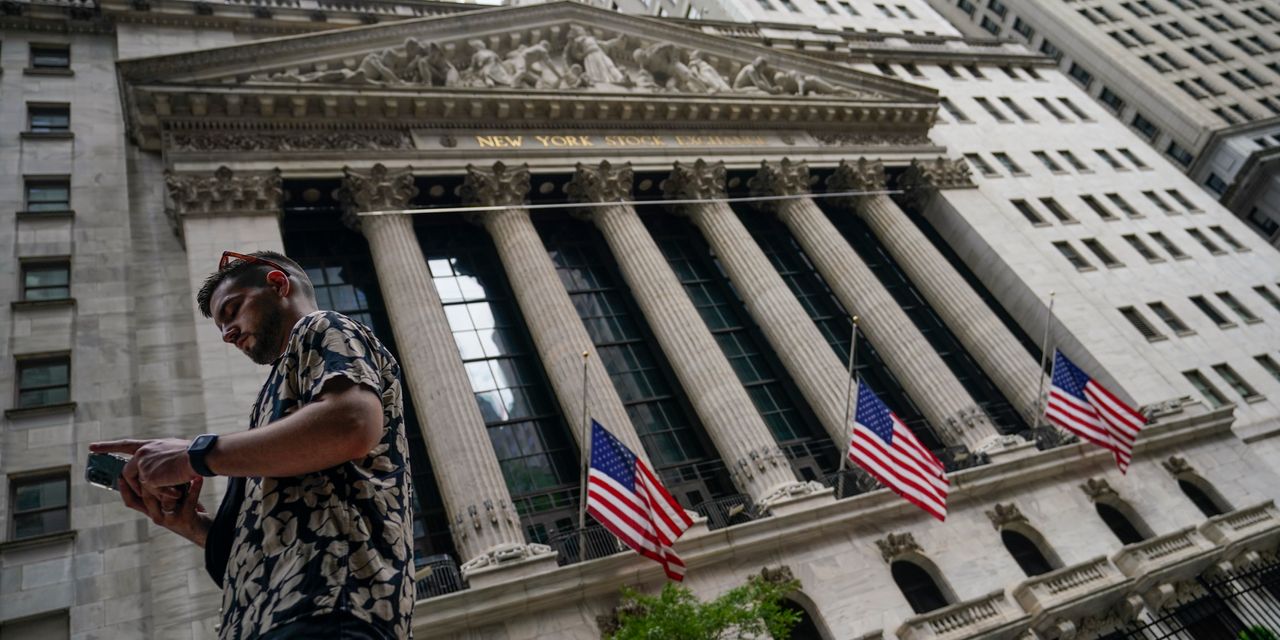U.S. stock futures pulled back on Thursday as investors warily eyed Treasury yields climbing to fresh 14-year highs. Also dragging tech stocks was a sharp drop in Tesla Inc. shares after disappointment over results.
How are stock-index futures trading
-
S&P 500 futures
ES00,
-0.46%
dipped 16 points, or 0.4% to 3691 -
Dow Jones Industrial Average futures
YM00,
-0.10%
fell 31 points, or 0.1% to 30429 -
Nasdaq 100 futures
NQ00,
-0.82%
eased 84 points, or 0.7% to 11069
On Wednesday, the Dow Jones Industrial Average
DJIA,
fell 100 points, or 0.33%, to 30424, the S&P 500
SPX,
declined 25 points, or 0.67%, to 3695, and the Nasdaq Composite
COMP,
dropped 92 points, or 0.85%, to 10681.
The Nasdaq Composite
COMP,
is up 3.8% from its 2022 closing low but remains down 31.7% for the year to date.
What’s driving markets
Benchmark bond yields at fresh 14-year highs continued to pressure stock markets as investors worried that rising borrowing costs amid rampant inflation will clobber economic growth.
S&P 500 futures ticked lower as the 10-year Treasury yield
TMUBMUSD10Y,
rose 3.3 basis points to 4.174%, the highest since late 2007.
Jim Reid, strategist at Deutsche Bank, noted that the equity rally at the start of the week had petered out “with Treasury yields hitting multi-year highs as investors turned their focus back to central banks and how fast they’ll hike rates”.
“All the big central banks are deciding policy over the next couple of weeks, so it’s not surprising that’s happening, but sentiment wasn’t helped either by further inflation surprises from the U.K. and Canada for September, which echoed what we’d already seen from the US last week, and added to the sense that the hiking cycle will be extended,” Reid added.
Confirming such concerns were statements this week from Federal Reserve officials, notably Minneapolis Fed President Neel Kashkari who reiterated the central bank may need to push its benchmark policy rate above 4.75% if underlying inflation does not stop rising. Markets are currently pricing in Fed funds rates of 5% by May next year.
Equity investors could at least gain succor from a mixed but mostly well-received corporate earnings reports, noted Richard Hunter, head of markets at Interactive Investor.
“The third quarter earnings season is beginning to pick up speed in the U.S., and so far the news has been marginally positive. After the bell, the releases continued the theme, with gains for IBM offset by share declines for Tesla and Alcoa,” Hunter said.
Tesla stock
TSLA,
was down more than 6% in premarket trading after results, forecasts and suggestions of a share buyback program failed to impress. IBM’s stock
IBM,
was up 3%, though tech elsewhere was struggling after Ericsson’s
ERIBR,
profits missed expectations and the shares fell 14%.
“For now, corporate America seems to be standing up well to the inflation storm, but a lot will depend on the big tech companies reporting next week – with the destiny of the markets in the hands of the likes of Apple
AAPL,
Alphabet
GOOG,
and Amazon
AMZN,
” said Russ Mould, AJ Bell investment director.
Results on the slate for Thursday include AT&T
T,
American Airlines
AAL,
CSX
CSX,
Union Pacific
UNP,
Dow
DOW,
and Phillip Morris
PM,
However, Nicholas Colas, co-founder of DataTrek Research suggested that the generally welcomed earnings season may paradoxically act as a damper to sentiment in the short run as it was helping to push up bond yields.
“We can’t help but think that still-decent corporate earnings must be spilling over into bond market psychology. Companies will not meaningfully reduce hiring and the pace of wage increases – the FOMC’s targets in its efforts to reduce price inflation – until earnings start to materially disappoint. This has not yet started to happen, ” said Colas.
U.S. economic updates set for release on Thursday, include weekly initial jobless claims and the October Philadelphia Fed manufacturing index, due at 8:30 a.m. September existing home sales and also leading economic indicators will be published at 10 a.m. All times Eastern.
